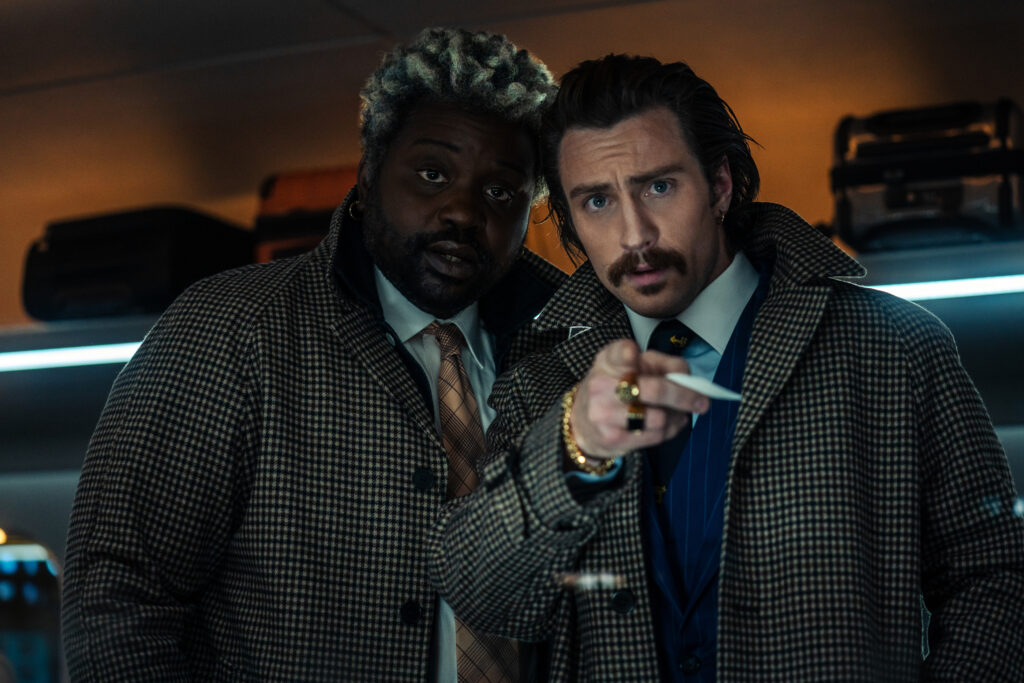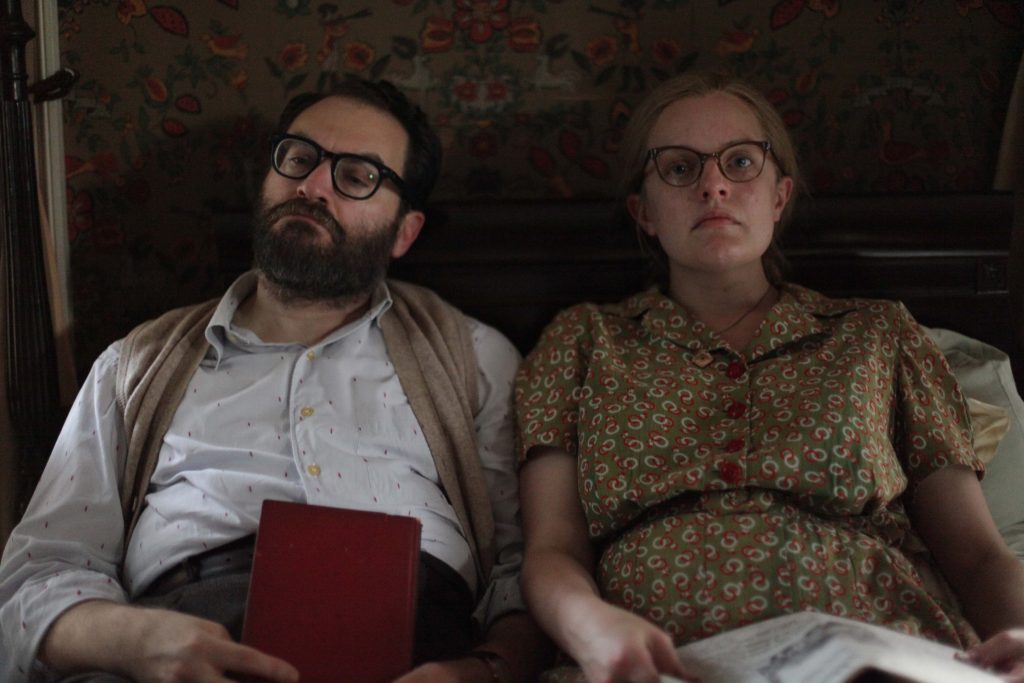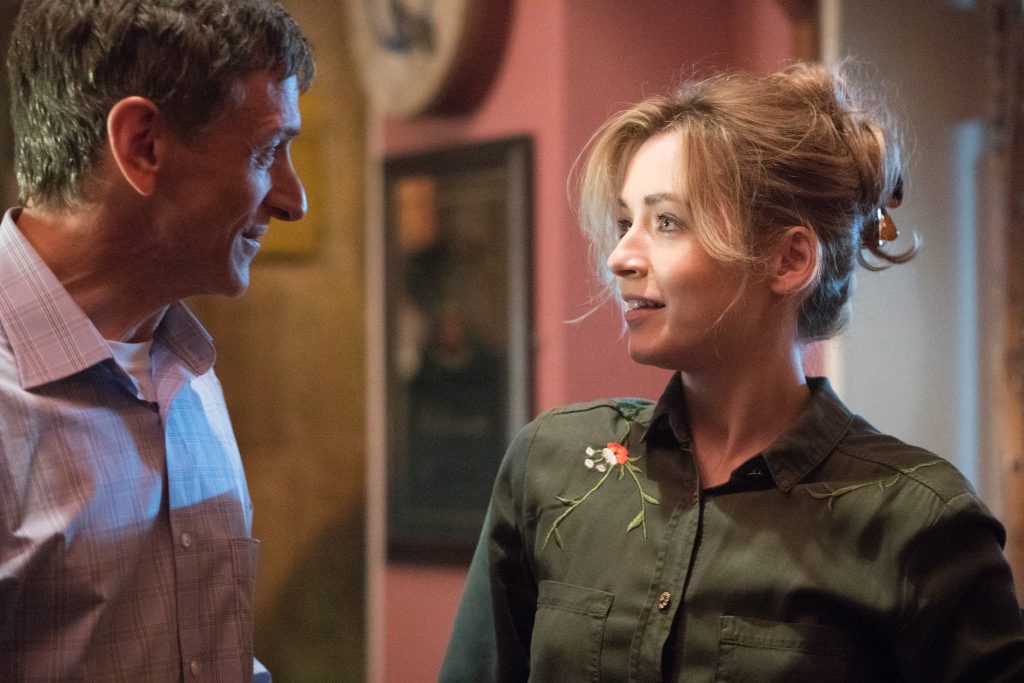August 2, 2022
by Carla Hay

Directed by David Leitch
Some language in Japanese, Spanish and Russian with subtitles
Culture Representation: Taking place primarily in Japan, the action film “Bullet Train” features a racially diverse cast of characters (white, black, Asian and Latino) representing the working-class, middle-class, wealthy and the criminal underground.
Culture Clash: A down-on-his luck American assassin has conflicts with international criminals during a ride on a fast-moving train traveling through Japan.
Culture Audience: “Bullet Train” will appeal primarily to people who are fans of star Brad Pitt; the novel on which the movie is based; and movies that give more importance to loud violence instead of an interesting and innovative story.

The jumbled and repetitive “Bullet Train” is just a fast-moving train wreck. The movie has plenty of famous co-stars but ultimately has little substance or imagination as an action comedy. “Bullet Train” over-relies on too many similar gags until it all becomes very dull and obnoxious. After a while, the action starts to look stale and formulaic. With few exceptions, the movie’s characters are no better than soulless, computer-generated characters in a video game.
Directed by David Leitch and written by Zak Olkewicz, “Bullet Train” is based on Kōtarō Isaka’s 2010 Japanese novel “MariaBeetle,” which was translated in English and renamed “Bullet Train” in 2021. In the book, all the characters are Japanese. The “Bullet Train” movie has a cast of international characters, with characters from the United States and the United Kingdom getting most of the screen time. Characters from Japan, Russia and Mexico are secondary characters. “Bullet Train” takes place primarily in Japan but the movie was filmed at Sony Pictures Studios in Culver City, California.
Prior to directing “Bullet Train,” Leitch directed the action feature films “Fast & Furious Presents: Hobbs & Shaw” (released in 2019) “Deadpool 2” (released in 2018) and “Atomic Blonde,” released in 2017. What all of these movies have in common is that they bit off more than they can chew. They’re very energetic when it comes to action scenes, but they’re very cluttered with sloppily edited characters and plot tangents that don’t necessarily serve the story very well. “Bullet Train” follows that same pattern. A better director would bring more finesse and charm to these movies instead of trying to make audiences think that violent action scenes are enough to make a good action flick.
People don’t really need to read the “Bullet Train”/”MariaBeetle” novel before seeing the “Bullet Train” movie. In fact, people who don’t know anything about the novel might be less disappointed in the “Bullet Train” movie, which dumbs down a lot of things about the novel. The “Bullet Train” movie removes a lot of the intrigue and personality that can be found in the novel, and substitutes it with an emphasis on staging scenes that are supposed to be outrageously violent.
In the “Bullet Train” movie, seven people on board the Nippon Speedline train going from Tokyo to Kyoto find their lives colliding and interwined because of various criminal activities:
- Ladybug (played by Brad Pitt) is a cynical and unlucky American assassin, whose current mission is to steal a briefcase full of ransom money.
- Tangerine (played by Aaron Taylor-Johnson) is a smooth-talking British assassin who likes to wear suits and gold jewelry but sometimes loses his seemingly suave cool with his hair-trigger temper.
- Lemon (played by Brian Tyree Henry) is Tangerine’s more even-tempered adoptive bother/partner in crime, who takes a more philosophical view of their assassin work and who is fixated on the children’s book/cartoon character Thomas the Tank Engine.
- The Prince (played by Joey King) is a sociopathic killer who disguises her evil by looking like an innocent teenage schoolgirl. (The character of the Prince was male in the “Bullet Train” novel.)
- Kimura (played by Andrew Koji) is a quiet, low-level criminal from Japan who’s out for revenge against the Prince for a heinous act committed against Kimura’s son.
- The Hornet (played by Zazie Beetz) is a sneaky assassin who usually goes undercover in disguise.
- The Wolf (played by Benito A Martínez Ocasio, also known as Bad Bunny) is a ruthless assassin/gang leader from Mexico.
Ladybug is in constant communication through earpieces with his no-nonsense boss/handler Maria (played by Sandra Bullock), who inexplicably seems to know and see everything on the train. (And no, Ladybug isn’t wearing a secret hidden camera.) Maria is ultimately a character that doesn’t add much to the story except to make Ladybug look even more bungling and foolish than he needed to be.
But in some ways, this odd-couple pairing of Maria and Ladybug would have made a better movie if focused on these two characters, because Bullock (in the limited time that she has in “Bullet Train”) brings a certain charisma to the role that “Bullet Train” lacks overall. Unfortunately, only Maria’s voice is heard for most of “Bullet Train,” which lessens the impact of Bullock’s talent for physical comedy (facial expressions and other body language) that would have benefited “Bullet Train.” It isn’t until toward the end of the movie that Maria appears on screen.
The only interesting trivia note about “Bullet Train” is that cast members Pitt, Bullock and Channing Tatum (who has a useless cameo in “Bullet Train”) were co-stars in another 2022 movie: the romantic comedy “The Lost City.” Neither movie is award-worthy, but at least the comedy in “The Lost City” was depicted in a more skillful way. “Bullet Train” has some sporadic moments where the jokes land as intended, but the rest of the comedy falls very flat. Tatum and “Deadpool” movie franchise star Ryan Reynolds have “Bullet Train” cameos that are quick and underwhelming.
The messy plot of “Bullet Train” involves the kidnapped, unnamed son (played by Logan Lerman) of a Russian mob boss called the White Death (played by Michael Shannon), with Tangerine and Lemon having the responsibility of guarding the son on the train and carrying a briefcase full of ransom money. Ladybug’s job is to steal the money. A running gag in the movie is that Ladybug has encountered some of these criminals before in assassin assignments that he botched, but he has forgotten about these experiences until he’s reminded of them.
Lots of shootouts, explosions, and bloody fights ensue. There’s also a recurring plot device involving snake poison and a Taiwanese Blue Beauty snake. Masi Oka (as the Conductor) and Karen Fukuhara (as Kayda Izumi Concession Girl) have utterly thankless and forgettable roles in this schlockfest.
Except for the wisecracking Ladybug and Kimura’s humble florist father The Elder (played by Hiroyuki Sanada), the characters in “Bullet Train” come across as very hollow, and viewers will have a hard time connecting with most of these characters. There’s no clever mystery in this story that will keep viewers guessing. “Bullet Train” certainly delivers if people want lackluster jokes and cartoonish violence, but it just adds up to a lot of mindless hot air.
Columbia Pictures will release “Bullet Train” in U.S. cinemas on August 5, 2022.




